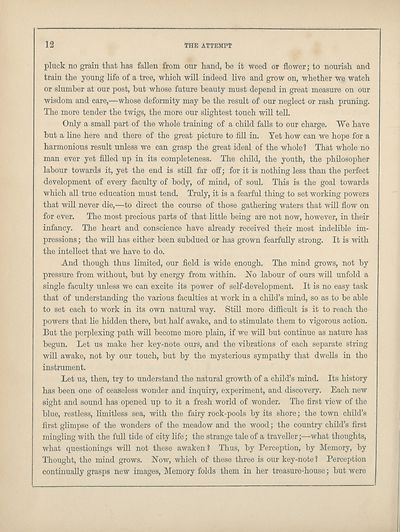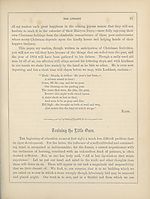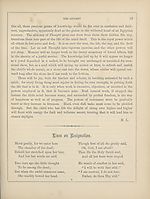Attempt > Volume 1 and Select writings
(22) Page 12
Download files
Complete book:
Individual page:
Thumbnail gallery: Grid view | List view

12
THE ATTEMPT
pluck no grain that has fallen from our hand, he it weed or flower; to nourish and
train the young life of a tree, which will indeed live and grow on, whether we watch
or slumber at our post, but whose future beauty must depend in great measure on our
wisdom and care,—whose deformity may be the result of our neglect or rash pruning.
The more tender the twigs, the more our slightest touch will tell.
Only a small part of the whole training of a child falls to our charge. We have
but a line here and there of the great picture to fill in. Yet how can we hope for a
harmonious result unless we can grasp the great ideal of the whole? That whole no
man ever yet filled up in its completeness. The child, the youth, the philosopher
labour towards it, yet the end is still far off; for it is nothing less than the perfect
development of every faculty of body, of mind, of soul. This is the goal towards
which all true education must tend. Truly, it is a fearful thing to set working powers
that will never die,—to direct the course of those gathering waters that will flow on
for ever. The most precious parts of that little being are not now, however, in their
infancy. The heart and conscience have already received their most indelible im¬
pressions ; the will has either been subdued or has grown fearfully strong. It is with
the intellect that we have to do.
And though thus limited, our field is wide enough. The mind grows, not by
pressure from without, but by energy from within. ATo labour of ours will unfold a
single faculty unless we can excite its power of self-development. It is no easy task
that of understanding the various faculties at work in a child’s mind, so as to be able
to set each to work in its own natural way. Still more difficult is it to reach the
powers that lie hidden there, but half awake, and to stimulate them to vigorous action.
But the perplexing path will become more plain, if we will but continue as nature has
begun. Let us make her key-note ours, and the vibrations of each separate striug
will awake, not by our touch, but by the mysterious sympathy that dwells in the
instrument.
Let us, then, try to understand the natural growth of a child’s mind. Its history
has been one of ceaseless wonder and inquiry, experiment, and discovery. Each new
sight and sound has opened up to it a fresh world of wonder. The first view of the
blue, restless, limitless sea, Avith the fairy rock-pools by its shore; the toAvn child’s
first glimpse of the wonders of the meadow and the wood; the country child’s first
mingling with the full tide of city life; the strange tale of a traveller;—what thoughts,
what questionings Avill not these awaken? Thus, by Perception, by Memory, by
Thought, the mind grows. Now, which of these three is our key-note? Perception
continually grasps neAV images, Memory folds them in her treasure-house; but were
THE ATTEMPT
pluck no grain that has fallen from our hand, he it weed or flower; to nourish and
train the young life of a tree, which will indeed live and grow on, whether we watch
or slumber at our post, but whose future beauty must depend in great measure on our
wisdom and care,—whose deformity may be the result of our neglect or rash pruning.
The more tender the twigs, the more our slightest touch will tell.
Only a small part of the whole training of a child falls to our charge. We have
but a line here and there of the great picture to fill in. Yet how can we hope for a
harmonious result unless we can grasp the great ideal of the whole? That whole no
man ever yet filled up in its completeness. The child, the youth, the philosopher
labour towards it, yet the end is still far off; for it is nothing less than the perfect
development of every faculty of body, of mind, of soul. This is the goal towards
which all true education must tend. Truly, it is a fearful thing to set working powers
that will never die,—to direct the course of those gathering waters that will flow on
for ever. The most precious parts of that little being are not now, however, in their
infancy. The heart and conscience have already received their most indelible im¬
pressions ; the will has either been subdued or has grown fearfully strong. It is with
the intellect that we have to do.
And though thus limited, our field is wide enough. The mind grows, not by
pressure from without, but by energy from within. ATo labour of ours will unfold a
single faculty unless we can excite its power of self-development. It is no easy task
that of understanding the various faculties at work in a child’s mind, so as to be able
to set each to work in its own natural way. Still more difficult is it to reach the
powers that lie hidden there, but half awake, and to stimulate them to vigorous action.
But the perplexing path will become more plain, if we will but continue as nature has
begun. Let us make her key-note ours, and the vibrations of each separate striug
will awake, not by our touch, but by the mysterious sympathy that dwells in the
instrument.
Let us, then, try to understand the natural growth of a child’s mind. Its history
has been one of ceaseless wonder and inquiry, experiment, and discovery. Each new
sight and sound has opened up to it a fresh world of wonder. The first view of the
blue, restless, limitless sea, Avith the fairy rock-pools by its shore; the toAvn child’s
first glimpse of the wonders of the meadow and the wood; the country child’s first
mingling with the full tide of city life; the strange tale of a traveller;—what thoughts,
what questionings Avill not these awaken? Thus, by Perception, by Memory, by
Thought, the mind grows. Now, which of these three is our key-note? Perception
continually grasps neAV images, Memory folds them in her treasure-house; but were
Set display mode to: Large image | Transcription
Images and transcriptions on this page, including medium image downloads, may be used under the Creative Commons Attribution 4.0 International Licence unless otherwise stated. ![]()
| Ladies' Edinburgh Debating Society publications > Attempt > Volume 1 and Select writings > (22) Page 12 |
|---|
| Permanent URL | https://digital.nls.uk/109865218 |
|---|
| Attribution and copyright: |
|
|---|

